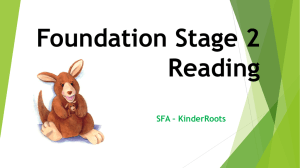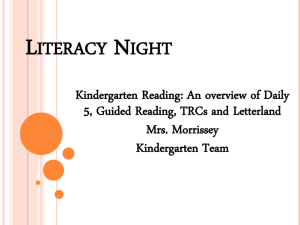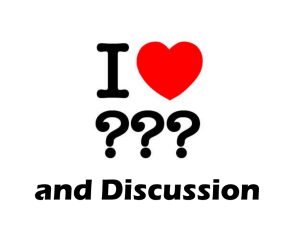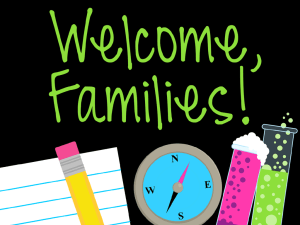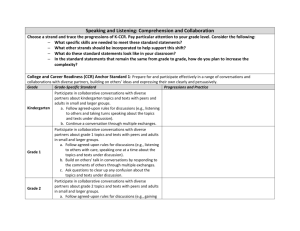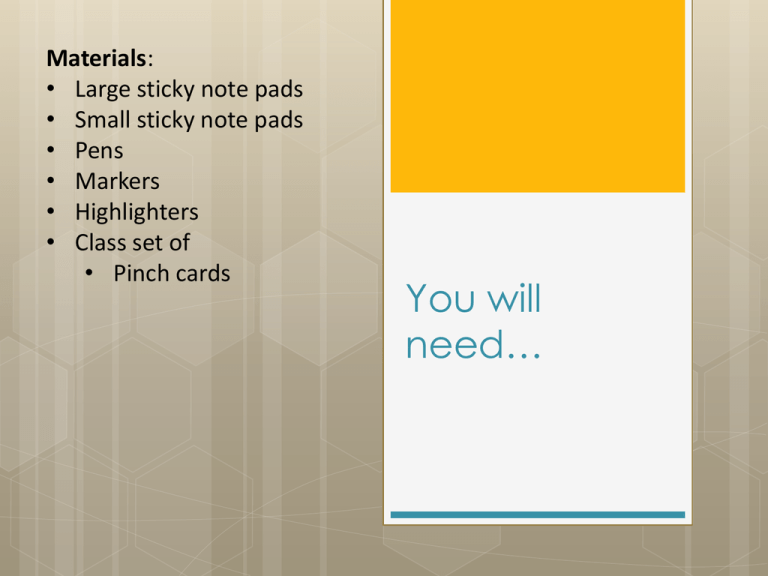
Materials:
• Large sticky note pads
• Small sticky note pads
• Pens
• Markers
• Highlighters
• Class set of
• Pinch cards
You will
need…
Speak up! Listen to me!
Speaking and Listening in the Elementary Classroom
Speak up!
Listen to me!
Maryland College and Career
Ready Standards
College & Career Ready
Conference
Session Outcomes
Participants will:
Discuss the Maryland College and Career
Ready Standards (MCCRS) for speaking
and listening
Identify the components of effective
speaking and listening instruction
Implement MCCRS strategies and
methods
Speaking & Listening
Day
to day purposeful, academic talk in one
on one, small group, or large group settings
Formal
sharing of information and concepts
including through the use of technology
Video
from Common Core contributor:
http://programs.ccsso.org/ccv/SP_10.m4v
Information retrieved from www.corestandards.org
Speaking & Listening
Anchor Standard Categories
Comprehension
& Collaboration
Presentation
of Knowledge
and Ideas
Speaking & Listening
Anchor Standards
Comprehension & Collaboration
SL.1 Prepare for and participate effectively in a
range of conversations and collaborations with
diverse partners, building on others' ideas and
expressing their own clearly and persuasively.
SL.2 Integrate and evaluate information
presented in diverse media and formats,
including visually, quantitatively, and orally.
SL.3 Evaluate a speaker's point of view,
reasoning, and use of evidence and rhetoric.
Speaking & Listening
Anchor Standards (continued)
Presentation of Knowledge & Ideas
SL.4 Present information, findings, and supporting
evidence such that listeners can follow the line of
reasoning and the organization, development, and
style are appropriate to task, purpose, and
audience.
SL.5 Make strategic use of digital media and visual
displays of data to express information and
enhance understanding of presentations.
SL.6 Adapt speech to a variety of contexts and
communicative tasks, demonstrating command of
formal English when indicated or appropriate.
Standard Progression
Grades 1-2 Comprehension & Collaboration
Grade 1
Grade 2
SL.1.1 Participate in
collaborative conversations
with diverse partners about
grade 1 topics and texts with
peers and adults in small
and larger groups.
SL.2.1 Participate in
collaborative conversations
with diverse partners about
grade 2 topics and texts with
peers and adults in small
and larger groups.
SL.1.1a, SL.1.1b, SL.1.1c
SL.2.1a, SL.2.1b, SL.2.1c
Standard Progression
Grades 1-2 Comprehension & Collaboration
Grade 1
Grade 2
SL.1.1.a Follow agreed upon
rules for discussions (e.g.,
listening to others with care,
speaking one at a time about
the topics and texts under
discussion).
SL.2.1.a Follow agreed upon rules
for discussions (e.g., gaining the
floor in respectful ways, listening to
others with care, speaking one at
a time about the topics and texts
under discussion).
SL.1.1.b Build on others’ talk in
conversations by responding to
the comments of others
through multiple exchanges.
SL.2.1.b Build on others’ talk in
conversation by linking their
comments to the remarks of
others.
SL.1.1.c Ask questions to clear
up any confusion about the
topics and texts under
discussion.
SL.2.1.c Ask for clarification and
further explanation as needed
about the topics and texts under
discussion.
Standard Progression
Grades 1-2 Comprehension & Collaboration
Grade 1
Grade 2
SL.1.2 Ask and answer
questions about key details in
a text read aloud or
information presented orally or
through other media.
SL.2.2 Recount or describe
key ideas or details from a
text read aloud or information
presented orally or through
other media.
SL.1.3 Ask and answer
questions about what a
speaker says in order to
gather additional information
or clarify something that is not
understood.
SL.2.3 Ask and answer
questions about what a
speaker says in order to clarify
comprehension, gather
additional information, or
deepen understanding of a
topic or issue.
Standard Progression
Grades 1-2 Presentation of Knowledge & Ideas
Grade 1
Grade 2
SL.1.4 Describe people, places,
things, and events with
relevant details, expressing
ideas and feelings clearly.
SL.2.4 Tell a story or recount an
experience with appropriate facts
and relevant, descriptive details,
speaking audibly in coherent
sentences.
SL.1.5 Add drawings or other
visual displays to descriptions
when appropriate to clarify
ideas, thoughts, and feelings.
SL.2.5 Create audio recordings of
stories or poems; add drawings or
other visual displays to stories or
recounts of experiences when
appropriate to clarify ideas,
thoughts, and feelings.
SL.1.6 Produce complete
sentences when appropriate
to task and situation.
SL.2.6 Produce complete sentences
when appropriate to task and
situation in order to provide
requested detail or clarification.
Standard Progression
Grades 3-4-5 Comprehension & Collaboration
Grade 3
Grade 4
Grade 5
SL.3.1 Engage
effectively in a
range of
collaborative
discussions (one-onone, in groups, and
teacher-led) with
diverse partners on
grade 3 topics and
texts, building on
others’ ideas and
expressing their own
clearly.
SL.4.1 Engage
effectively in a
range of
collaborative
discussions (one-onone, in groups, and
teacher-led) with
diverse partners on
grade 4 topics and
texts, building on
others’ ideas and
expressing their own
clearly.
SL.5.1 Engage
effectively in a
range of
collaborative
discussions (one-onone, in groups, and
teacher-led) with
diverse partners on
grade 5 topics and
texts, building on
others’ ideas and
expressing their own
clearly.
Standard Progression
Grades 3-4-5 Comprehension & Collaboration
Grade 3
Grade 4
Grade 5
SL.3.1.a Come to
discussions prepared,
having read or
studied required
material; explicitly
draw on that
preparation and
other information
known about the
topic to explore ideas
under discussion.
SL.4.1.a Come to
discussions prepared,
having read or
studied required
material; explicitly
draw on that
preparation and
other information
known about the
topic to explore ideas
under discussion.
SL.5.1.a Come to
discussions prepared,
having read or
studied required
material; explicitly
draw on that
preparation and
other information
known about the
topic to explore ideas
under discussion.
SL.3.1.b Follow
agreed-upon rules for
discussions.
SL.4.1.b Follow
agreed-upon rules for
discussions and carry
out assigned roles.
SL.5.1.b Follow
agreed-upon rules for
discussions and carry
out assigned roles.
Standard Progression
Grades 3-4-5 Comprehension & Collaboration
Grade 3
Grade 4
Grade 5
SL.3.1.c Ask questions
to check
understanding of
information presented,
stay on topic, and link
their comments to the
remarks of others.
SL.4.1.c Pose and
respond to specific
questions to clarify or
follow up on
information, and make
comments that
contribute to the
discussion and link to
the remarks of others.
SL.5.1.c Pose and
respond to specific
questions to clarify or
follow up on information,
and make comments
that contribute to the
discussion and elaborate
on the remarks of others.
SL.3.1.d Explain their
own ideas and
understanding in light
of the discussion.
SL.4.1.d Review the key
ideas expressed and
explain their own ideas
and understanding in
light of the discussion.
SL.5.1.d Review the key
ideas expressed and
draw conclusions in light
of information and
knowledge gained from
the discussions.
Standard Progression
Grades 3-4-5 Comprehension & Collaboration
Grade 3
Grade 4
Grade 5
SL.3.2 Determine the
main ideas and
supporting details of a
text read aloud or
information presented
in diverse media and
formats, including
visually, quantitatively,
and orally.
SL.4.2 Paraphrase
portions of a text read
aloud or information
presented in diverse
media and formats,
including visually,
quantitatively, and
orally.
SL.5.2 Summarize a
written text read aloud
or information
presented in diverse
media and formats,
including visually,
quantitatively, and
orally.
SL.3.3 Ask and answer
questions about
information from a
speaker, offering
appropriate
elaboration and detail.
SL.4.3 Identify the
reasons and evidence a
speaker provides to
support particular
points.
SL.5.3 Summarize the
points a speaker makes
and explain how each
claim is supported by
reasons and evidence.
Standard Progression
Grades 3-4-5 Presentation of Knowledge & Ideas
Grade 3
Grade 4
Grade 5
SL.3.4 Report on a topic or
text, tell a story, or recount
an experience with
appropriate facts and
relevant, descriptive
details, speaking clearly at
an understandable pace.
SL.4.4 Report on a topic or
text, tell a story, or recount
an experience in an
organized manner, using
appropriate facts and
relevant, descriptive details
to support main ideas or
themes; speak clearly at an
understandable pace.
SL.5.4 Report on a topic
or text or present an
opinion, sequencing
ideas logically and using
appropriate facts and
relevant, descriptive
details to support main
ideas or themes; speak
clearly at an
understandable pace.
SL.3.5 Create engaging
audio recordings of stories
or poems that
demonstrate fluid reading
at an understandable
pace; add visual displays
when appropriate to
emphasize or enhance
certain facts or details.
SL.4.5 Add audio recordings
and visual displays to
presentations when
appropriate to enhance the
development of main ideas
or themes.
SL.5.5 Include multimedia
components and visual
displays in presentations
when appropriate to
enhance the
development of main
ideas or themes.
Standard Progression
Grades 3-4-5 Presentation of Knowledge & Ideas
Grade 3
Grade 4
Grade 5
SL.3.6 Speak in
complete
sentences when
appropriate to
task and situation
in order to provide
requested detail
or clarification.
SL.4.6 Differentiate
between contexts
that call for formal
English and
situations where
informal discourse
is appropriate; use
formal English
when appropriate
to task and
situation.
SL.5.6 Adapt
speech to a
variety of contexts
and tasks, using
formal English
when appropriate
to task and
situation.
Assessment & Evaluation
PARCC
2015-2016 School Year
Teachers score student content
Real Time Engagement (MODE 1)
Advance Preparation (MODE 2)
Assessment & Evaluation
Daily,
ongoing
Name
Date
Text
Tally Chart
Anecdotal Notes
Notes
Tally Tracking
Tricks of the Trade
What are some tricks of the trade
you use to facilitate speaking
and listening instruction?
Best Practices
Follow
agreed-upon rules for discussion
Build on text talk
Respond to others
Ask and answer rich questions
Be
prepared
Hot Spots
Highlighting
Sticky notes
Notations
Text Coding (+ ! ?)
Standards in action
Intermediate
students
preparing for class
conversation
https://www.teachingc
hannel.org/videos/anal
yzing-text-brainstorming
Evaluate
Accountable Talk:
What are your first
reactions to this video
clip?
How are the
standards reflected in
this video clip?
Collaborative
Conversation
Pinch
cards
Nonverbal hand signals
I think…/We think…
Chat Chips
Accountable Talk
cards or placemats
Standards in action
Primary
students in
collaborative
conversation
https://www.youtube.
com/watch?feature=
player_embedded&v
=uRUsAoyRRHU
Evaluate
Accountable Talk:
What are your first
reactions to this video
clip?
How are the
standards reflected in
this video clip?
Instructional Implications
How
do we ensure accountability for
collaborative conversations using a
variety of strategies and texts?
Challenges/Strengths?
Resources
MSDE
Blackboard
https://msde.blackboard.com/webapps/p
ortal/frameset.jsp
Username: msdeguest
Password: msdeguest
Teaching
Channel
Speaking & Listening as a vehicle for writing
MSDE contact information
Ava
Spencer, ELA Coordinator,
MSDE
410-767-0830
Aspencer@msde.state.md.us
Thank you!


